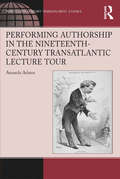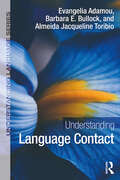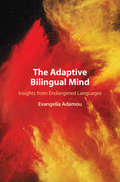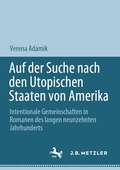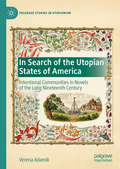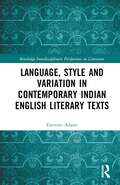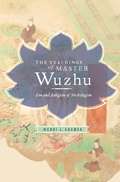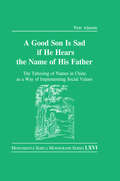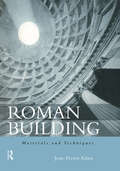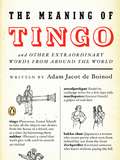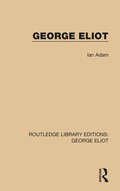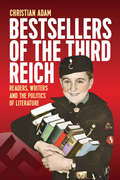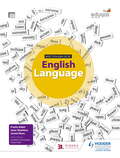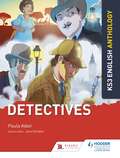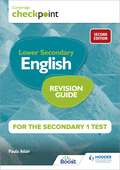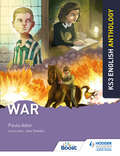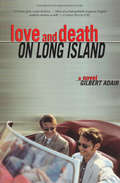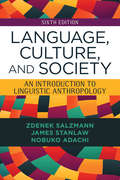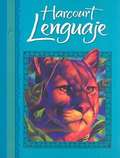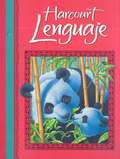- Table View
- List View
Performing Authorship in the Nineteenth-Century Transatlantic Lecture Tour (Ashgate Series in Nineteenth-Century Transatlantic Studies)
by Amanda AdamsExpanding our understanding of what it meant to be a nineteenth-century author, Amanda Adams takes up the concept of performative, embodied authorship in relationship to the transatlantic lecture tour. Adams argues that these tours were a central aspect of nineteenth-century authorship, at a time when authors were becoming celebrities and celebrities were international. Spanning the years from 1834 to 1904, Adams’s book examines the British lecture tours of American authors such as Frederick Douglass, Harriet Beecher Stowe, and Mark Twain, and the American lecture tours of British writers that include Harriet Martineau, Charles Dickens, Oscar Wilde, and Matthew Arnold. Adams concludes her study with a discussion of Henry James, whose American lecture tour took place after a decades-long absence. In highlighting the wide range of authors who participated in this phenomenon, Adams makes a case for the lecture tour as a microcosm for nineteenth-century authorship in all its contradictions and complexity.
Understanding Language Contact (Understanding Language)
by Evangelia Adamou Barbara E. Bullock Almeida Jacqueline ToribioUnderstanding Language Contact offers an accessible and empirically grounded introduction to contact linguistics. Rather than taking a traditional focus on the outcomes of language contact, this book takes the novel approach of considering these outcomes as an endpoint of bilingualism and multilingualism. Covering speech production and comprehension, language diffusion across different interactional networks and timeframes, and the historical outcomes of contact-induced language change, this book: Discusses both how these areas relate to one another and how they correspond to different theoretical fields and methodologies; Draws together concepts and methodological/theoretical advances from the related fields of bilingualism and sociolinguistics to show how these can shed new light on the traditional field of contact linguistics; Presents up-to-date research in a digestible form; Includes examples from a wide range of contact languages, including Creoles and pidgins; Indigenous, minority, and heritage languages; mixed languages; and immigrants' linguistic practices, to illustrate ideas and concepts; Features exercises to test students’ understanding as well as suggestions for further reading to expand knowledge in specific areas. Written by three experienced teachers and researchers in this area, Understanding Language Contact is key reading for advanced undergraduate and postgraduate students approaching bilingualism and language contact for the first time.
The Adaptive Bilingual Mind: Insights from Endangered Languages
by Evangelia AdamouAt present, much of the research on bilingual cognition focuses on late second language learners of a small number of languages. In this fascinating book, Evangelia Adamou widens the net by integrating advances in the field of bilingualism with the study of endangered languages. Drawing on recent studies from Europe and Latin America, she demonstrates that experimental psycholinguistic methods can be successfully applied outside the lab and, conversely, how data from these understudied populations provide new insights into the adaptive capacities of the bilingual mind. Adamou shows how bilinguals manage competing conceptualizations of time and space, how their grammars and language mixing patterns adapt to cognitive constraints such as the need for simplification, and how language processing concurrently adapts to their complex bilingual experience. Combining statistical analyses with detailed linguistic and ethnographic information, this essential book will appeal to scholars of bilingualism, cognitive sciences, language endangerment, and language contact.
Auf der Suche nach den Utopischen Staaten von Amerika: Intentionale Gemeinschaften in Romanen des langen neunzehnten Jahrhunderts
by Verena AdamikIn diesem Buch wird versucht, die scheinbar direkte Verbindung zwischen Utopismus und den USA zu verstehen, indem Romane besprochen werden, die in dieser Kombination noch nie zusammengebracht wurden, obwohl sie sich alle um intentionale Gemeinschaften drehen: Imlays The Emigrants (1793), Hawthornes The Blithedale Romance (1852), Howlands Papas Own Girl (1874), Griggs' Imperium in Imperio (1899), und Du Bois' The Quest of the Silver Fleece (1911). Sie setzen Nation und Utopie nicht in Beziehung, indem sie perfekte Gesellschaften beschreiben, sondern indem sie über Versuche schreiben, unmittelbar ein radikal anderes Leben zu führen. Indem die Lektüre die jeweilige kommunale Geschichte aufzeigt, bietet sie eine literarische Perspektive für kommunale Studien und trägt zu einer dringend notwendigen Historisierung für rein literarische Ansätze zum US-Utopismus und für Studien bei, die sich auf Pilgrims/Puritans/Gründerväter als utopische Praxis konzentrieren. Das Buch zeigt daher auf, wie die Autoren das utopische Potenzial der USA bewerteten, und zeichnet die Entwicklung der utopischen Vorstellungskraft im neunzehnten Jahrhundert aus verschiedenen Perspektiven nach.
In Search of the Utopian States of America: Intentional Communities in Novels of the Long Nineteenth Century (Palgrave Studies in Utopianism)
by Verena AdamikThis book endeavours to understand the seemingly direct link between utopianism and the USA, discussing novels that have never been brought together in this combination before, even though they all revolve around intentional communities: Imlay’s The Emigrants (1793), Hawthorne’s The Blithedale Romance (1852), Howland’s Papas Own Girl (1874), Griggs’s Imperium in Imperio (1899), and Du Bois’s The Quest of the Silver Fleece (1911). They relate nation and utopia not by describing perfect societies, but by writing about attempts to immediately live radically different lives. Signposting the respective communal history, the readings provide a literary perspective to communal studies, and add to a deeply necessary historicization for strictly literary approaches to US utopianism, and for studies that focus on Pilgrims/Puritans/Founding Fathers as utopian practitioners. This book therefore highlights how the authors evaluated the USA’s utopian potential and traces the nineteenth-century development of the utopian imagination from various perspectives.
Language, Style and Variation in Contemporary Indian English Literary Texts (Routledge Interdisciplinary Perspectives on Literature)
by Esterino AdamiLanguage, Style and Variation in Contemporary Indian English Literary Texts is a volume which examines the linguistic and stylistic forms of Indian English in new fictional texts to explore the power of language to construct meaning, express identity, and convey ideology. Specifically, this study proposes the elaboration and application of postcolonial stylistics, i.e. an interdisciplinary methodology that uses different disciplines, such as literary linguistics and postcolonial studies as a critical lens to read contemporary Indian authors like Jeet Thayil, Deepa Anappara, Avni Doshi, Tabish Khair, and Megha Majumdar. The linguistic fabric of their fiction is investigated in a series of case studies, observing the stylistic rendition of a wide range of themes and tropes, such as the representation of Otherness, drug discourse, lament and the senses, which cumulatively portray aspects of the current Indian narrative scenario. The book develops ideas growing out of several disciplines to reach a fuller understanding of cultural phenomena in the postcolonial context, and by extension in the social world.
The Teachings of Master Wuzhu: Zen and Religion of No-Religion (Translations from the Asian Classics)
by Wendi AdamekThe Record of the Dharma-Jewel Through the Generations (Lidai fabao ji) is a little-known Chan/Zen Buddhist text of the eighth century, rediscovered in 1900 at the Silk Road oasis of Dunhuang. The only remaining artifact of the Bao Tang Chan school of Sichuan, the text provides a fascinating sectarian history of Chinese Buddhism intended to showcase the iconoclastic teachings of Bao Tang founder Chan Master Wuzhu (714–774). Wendi Adamek not only brings Master Wuzhu's experimental community to life but also situates his paradigm-shifting teachings within the history of Buddhist thought. Having published the first translation of the Lidai fabao ji in a Western language, she revises and presents it here for wide readership.Written by disciples of Master Wuzhu, the Lidai fabao ji is one of the earliest attempts to implement a "religion of no-religion," doing away with ritual and devotionalism in favor of "formless practice." Master Wuzhu also challenged the distinctions between lay and ordained worshippers and male and female practitioners. The Lidai fabao ji captures his radical teachings through his reinterpretation of the Chinese practices of merit, repentance, precepts, and Dharma transmission. These aspects of traditional Buddhism continue to be topics of debate in contemporary practice groups, making the Lidai fabao ji a vital document of the struggles, compromises, and insights of an earlier era. Adamek's volume opens with a vivid introduction animating Master Wuzhu's cultural environment and comparing his teachings to other Buddhist and historical sources.
Good Son is Sad If He Hears the Name of His Father: The Tabooing of Names in China as a Way of Implementing Social Values (Monumenta Serica Monograph Ser.)
by Piotr AdamekWhen in 1775 the scholar Wang Xihou compiled a dictionary called Ziguan , he wrote, for illustrative purposes, the personal names of Confucius and the three emperors Kangxi, Yongzheng and Qianlong in the introduction. In oversight, he recorded their complete names. This accidental writing of a few names was condemned by Emperor Qianlong as an unprecedented crime, rebellion and high treason. Wang Xihou was executed, his property confiscated and his books were burnt. His family was arrested and his sons and grandsons were killed or sent as slaves to Heilongjiang. It is surprising what an enormous impact the tabooing of names (bihui ) had on Chinese culture. The names of sovereigns, ancestors, officials, teachers, and even friends were all considered taboo, in other words it was prohibited to pronounce them or to record them in writing. In numerous cases characters identical or similar in writing or pronunciation were often avoided as well. The tabooing of names was observed in the family and on the street, in the office and in the emperor's palace. The practice of bihui had serious consequences for the daily lives of the Chinese and for Chinese historiography. People even avoided certain places and things, and refused to accept offices. They were punished and sometimes even killed in connection with the tabooing of names. The bihui custom existed as an important element of Chinese culture and was perceived as significant by Chinese and foreigners alike. It was crucial for implementing social values and demonstrating the political hierarchy. The present work A Good Son Is Sad if He Hears the Name of His Father is a systematic study of Chinese name-tabooing customs, which until now have been relatively little explored in Western-language Sinological studies. It attempts to provide a long-term perspective on the changing dynamics of tabooing and elucidates various aspects related to the fascinating topic of tabooing of names.
Roman Building: Materials and Techniques
by Jean-Pierre AdamWith over 750 illustrations, Roman Buildings is a thorough and systematic examination of Roman architecture and building practice, looking at large-scale public buildings as well as more modest homes and shops. Placing emphasis on the technical aspects of the subject, the author follows the process of building through each stage -- from quarry to standing wall, from tree to roof timbers -- and describes how these materials were obtained or manufactured. The author also discusses interior decoration and looks at the practical aspects of water supply, heating and roads.
The Meaning of Tingo
by Adam Jacot de BoinodDid you know that people in Indonesia have a word that means 'to take off your clothes in order to dance'? Or how many words the Albanians have for eyebrows and moustaches? Or that the Dutch word for skimming stones is plimpplamppletteren? Drawing on the collective wisdom of over 154 languages, this intriguing book is arranged by theme so you can compare attitudes all over the world to such subjects as food, the human body and the battle of the sexes. Here you can find not only those words for which there is no direct counterpart in English (such as the Japanese age-otori which means looking less attractive after a haircut), but also a frank discussion of exactly how many 'Eskimo' terms there are for snow, and a vast array of information exploring the wonderful and often downright strange world of words. Oh, and tingo means 'to take all the objects one desires from the house of a friend, one at a time, by asking to borrow them'.
George Eliot (Routledge Library Editions: George Eliot #1)
by Ian AdamFirst published in 1969. George Eliot is a writer of ordinary human experience, whose work emphasizes commonplace characters and commonplace situations. Her mind, however, was far from ordinary. Professor Adam shows how wit, observation and sympathy, combined with a lucid and energetic intelligence, enabled her to invest the commonplace with complexity and importance. Extracts from George Eliot’s major novels illustrate her treatment of character, setting, dialogue and narrative, while the author’s commentary discusses the particulars of her artistic procedures and techniques. This title will be of interest to students of literature.
Bestsellers of the Third Reich: Readers, Writers and the Politics of Literature
by Christian AdamDespite the displacement of countless authors, frequent bans of specific titles, and high-profile book burnings, the German book industry boomed during the Nazi period. Notwithstanding the millions of copies of Mein Kampf that were sold, the era’s most popular books were diverse and often surprising in retrospect, despite an oppressive ideological and cultural climate: Huxley’s Brave New World was widely read in the 1930s, while Saint-Exupéry’s Wind, Sand and Stars was a great success during the war years. Bestsellers of the Third Reich surveys this motley collection of books, along with the circumstances of their publication, to provide an innovative new window into the history of Nazi Germany.
WJEC Eduqas GCSE English Language Student Book
by Paula Adair Jane Sheldon Jamie ReesExam Board: WJECLevel: GCSESubject: EnglishFirst Teaching: September 2015First Exam: June 2017Endorsed by WJEC EduqasBring out the best in every student, enabling them to develop strong reading and writing skills with a single Student's Book that contains a rich bank of stimulus texts and progressive activities for all ability levels.- Helps students to identify and improve the skills required for each component of the new examinations through clear coverage of the Assessment Objectives in every unit- Includes a wide range of engaging literary and non-fiction texts that aid comprehension and provide effective models for students' own writing for different purposes and genres- Steadily boosts students' confidence and knowledge throughout the course, using a three-part structure that presents opportunities to learn, practise and enhance their English language skills- Encourages students to take responsibility for their skills development and prioritise their revision needs with self-assessment criteria at the start and end of each unit- Prepares students of differing abilities for their exams with a variety of question types and sample answers that demonstrate clearly how to improve their responses- Offers trusted, question-focused advice from an author team with extensive teaching and examining experience
Key Stage 3 English Anthology: Detectives
by Paula Adair Jane SheldonInspire your teaching with Key Stage 3 English Anthology: Detectives, a themed anthology for Year 7. Featuring mysterious page turners starring Sherlock Holmes and Poirot, this Anthology guides students through fiction, non-fiction and poetry, encouraging them to connect with a variety of texts to gain a thorough understanding of the context and literary techniques underpinning each piece.Each extract is supported by Teaching and Learning Resources, including quizzes, lesson plans and PowerPoint slides to help you implement the content of the book.Each extract includes:- A context panel to provide key information to set the scene - Glossaries and annotations to help students work through each extract confidently- Look closer: key questions for students to consider as they work through the extracts- Now try this: writing and speaking activities to encourage students to get creative and actively engage with the text- Fast finisher tasks to support students who race ahead- A practice question to familiarise students with the command words they will see at GCSE
Cambridge Checkpoint Lower Secondary English Revision Guide for the Secondary 1 Test 2nd edition
by Paula AdairAchieve maximum potential using step-by-step guidance that helps to practise skills learned and improve exam technique. - Build confidence with practical study tips and effective revision strategies. - Reinforce understanding with clear explanations of every topic covered in the Cambridge Lower Secondary Checkpoint English curriculum framework, including Spelling, Grammar and Vocabulary. - Strengthen and test knowledge using a range of poetry, fiction and non-fiction texts with related questions and worked examples. Answers to the practice test papers are available free online at www.hoddereducation.com/cambridgeextras
Cambridge Checkpoint Lower Secondary English Revision Guide for the Secondary 1 Test 2nd edition
by Paula AdairAchieve maximum potential using step-by-step guidance that helps to practise skills learned and improve exam technique. - Build confidence with practical study tips and effective revision strategies. - Reinforce understanding with clear explanations of every topic covered in the Cambridge Lower Secondary Checkpoint English curriculum framework, including Spelling, Grammar and Vocabulary. - Strengthen and test knowledge using a range of poetry, fiction and non-fiction texts with related questions and worked examples. Answers to the practice test papers are available free online at www.hoddereducation.com/cambridgeextras
Key Stage 3 English Anthology: Detectives
by Paula AdairInspire your teaching with Key Stage 3 English Anthology: Detectives, a themed anthology for Year 7. Featuring mysterious page turners starring Sherlock Holmes and Poirot, this Anthology guides students through fiction, non-fiction and poetry, encouraging them to connect with a variety of texts to gain a thorough understanding of the context and literary techniques underpinning each piece.Each extract is supported by Teaching and Learning Resources, including quizzes, lesson plans and PowerPoint slides to help you implement the content of the book.Each extract includes:- A context panel to provide key information to set the scene - Glossaries and annotations to help students work through each extract confidently- Look closer: key questions for students to consider as they work through the extracts- Now try this: writing and speaking activities to encourage students to get creative and actively engage with the text- Fast finisher tasks to support students who race ahead- A practice question to familiarise students with the command words they will see at GCSE
Key Stage 3 English Anthology: War
by Paula AdairInspire your teaching with Key Stage 3 English Anthology: War, a themed anthology for Year 8.Featuring a moving mixture of poetry and prose, this Anthology guides students through a variety of extracts encouraging them to connect with the text to gain a thorough understanding of the context and literary techniques underpinning each piece of work.Each extract is supported by Teaching and Learning Resources, including quizzes, lesson plans and PowerPoint slides to help you implement the content of the book.Each extract includes:- A context panel to provide key information to set the scene of each extract- Glossaries and annotations to help students work through each extract confidently- Look closer: key questions for students to consider as they work through the extracts- Now try this: writing and speaking activities to encourage students to get creative and actively engage with the text- Fast finisher tasks to support students who race ahead- A practice question to familiarise students with the command words they will see at GCSE
Key Stage 3 English Anthology: War
by Paula AdairInspire your teaching with Key Stage 3 English Anthology: War, a themed anthology for Year 8.Featuring a moving mixture of poetry and prose, this Anthology guides students through a variety of extracts encouraging them to connect with the text to gain a thorough understanding of the context and literary techniques underpinning each piece of work.Each extract is supported by Teaching and Learning Resources, including quizzes, lesson plans and PowerPoint slides to help you implement the content of the book.Each extract includes:- A context panel to provide key information to set the scene of each extract- Glossaries and annotations to help students work through each extract confidently- Look closer: key questions for students to consider as they work through the extracts- Now try this: writing and speaking activities to encourage students to get creative and actively engage with the text- Fast finisher tasks to support students who race ahead- A practice question to familiarise students with the command words they will see at GCSE
Love and Death on Long Island: A Novel
by Gilbert Adair"A literary gem, a tour de force . . . Beautifully constructed, superbly characterized. What disturbs is the sheer elegance of Adair’s prose style -- most of us had probably forgotten English could be written so well.” -- Literary Review (U.K.)
Language, Culture, and Society
by Nobuko Adachi James Stanlaw Zdenek SalzmannSince 1993, professors have turned to Language, Culture, and Society for its comprehensive coverage of all critical aspects of linguistic anthropology. The revised and updated sixth edition features: A greatly expanded discussion of the sociocultural context of language, including a new chapter on gender and a thoroughly revised and broadened chapter on race, ethnicity, and class End-of-chapter resource manuals and study guides with key terms, questions for discussion, group and individual projects, objective study questions and problems (with answers), and suggestions for further reading Additional exercises on phonetics and syntax that reflect contemporary research Sidebars and boxes throughout the book that provide ethnographic detail and illustrate the practical experience of conducting linguistic research A global perspective and a focus on transnational and multilingual anthropology Expanded sections on written languages and theoretical and historical perspectives of linguistic anthropology.
Harcourt Lenguaje (Grade #2)
by Alma Flor Ada F. Isabel CampoyA language arts textbook in Spanish for 2nd graders.
